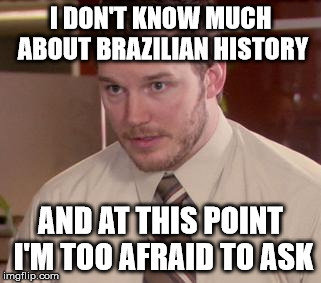History: understand the cultura e política Brasileira Posted by Ester on Feb 2, 2016 in Brazilian Profile, Culture, Economy, Geography, Learning
This brief história do Brasil will help you understand a little bit more about the country, politics as well as the culture.

Why do Brazilians speak Portuguese? We all know it is because Brazilians were colonized by the Portuguese, who crossed the Atlantic Ocean, arriving in Brazil on 22 April, 1500. But what really happened after their arrival? Take a look at this Transparent Language Blog post to learn more about the country’s history from 1500 to the end of the Kingdom and Empire of Brazil in 1889.
Only at the end of the 19th century did the country start to be shaped into what is it today. A Republican military group led by General Deodoro da Fonseca, who became the first president, deposed Dom Pedro II at the end of 1889. The name of the country was changed into República dos Estados Unidos do Brasil (Republic of the United States of Brazil). Only in 1891 was the Republican Constitution created and the State divided into three powers: legislative, executive and Judiciary.
After 1884, elected presidents for the 4-year term were whether from the states of Minas Gerais or São Paulo. This was not a coincidence and it even has a name: Política do Café com Leite (coffee with milk politics) since Minas was the biggest producer of milk and São Paulo was the biggest coffee producer. Fazendeiros e proprietário de terra (farmers as well as landowners) would support some candidates using their power and influence to control the vote of the população.
From 1893 to 1926 the country was crying out for more democratic changes. Civilian as well as military movements started to occur all over the country. In 1930, Getúlio Vargas, backed up by the Brazilian Army after having lost the election, assumed the presidency of Brazil as a ditador (dictator) for 15 years. He was known as pai dos pobres (father of the poor) due to the fact that many work laws were created and enforced by his government. Vargas was a populist who supported nationalism, industrialization as well as social welfare, he was also an anti-communist. The Brazilian economy grew significantly during his years as a dictator and he created state companies such as Petrobrás (which is now a multinational energy corporation) and Vale (a major mining company).
The majority of the nation considered Vargas a great man and president. For different reasons he helped Brazil create a national identity, which had never happened before maybe due to the territory being so vast. Vargas did this mainly by supporting the Brazilian national soccer team and getting the media to help make soccer the distraction and entertainment the nation needed, at the same time making every Brazilian from different social and economic backgrounds feel like they have something in common.
In 1945 Marshal Eurico Gaspar Dutra became president of Brazil, serving for 5 years before stepping down for Getúlio Vargas, who this time, was elected by the public. However, Vargas encountered some difficulties when there was an attempt on his biggest opponents life and a Major was killed in the incident. After that the military demanded Vargas stepped down since they had information that Vargas personal guard was responsible for the death of Major Rubens Vaz. With nowhere to go Vargas shot himself on the chest on 24 August, 1954, committing suicide and leaving a letter. This letter is still famous nowadays and its ending is widely quoted by people when talking about history and politics: “Serenamente dou o primeiro passo no caminho da eternidade e saio da vida para entrar na história” (“Serenely, I take my first step on the road to eternity and I leave life to enter history”).
Jucelino Kubitschek, former prefeito (mayor) of Belo Horizonte and governador (governor) of Minas Gerais assumed the presidency from 1956 to 1961, during his term the country grew economically and was politically stable in the democratic regime. Kubistchek was the president who moved the capital from Rio de Janeiro to Brasília, hiring renowned architect Oscar Niemeyer to project the capital city, which is shaped like an airplane.
The next big political change in Brazil was when the right-wing army took over and the country was under a ditadura militar (military dictatorship) from 1964 to 1985. The military felt the economy was not growing as fast as it should and that a dictatorship would be a faster way to implement economic policies rather than through democracy and that controlling the population in general would be easier. There was indeed crescimento econômico (economic growth) at first, but by the end of the ditadura Brazil was left with a massive débito nacional (national debt). Not to mention the thousands of people who were tortured, murdered, imprisoned and deported for opposing the dictatorship.
In 1985 Brazil elected the first president (by indirect election) after the dictatorship and in 1989 the first president elected by popular vote was Fernando Collor de Mello, who won against Lula (president from 2003 to 2010).
There was a monetary change in 1994 from Cruzeiro to Real. The implementation was made by former ministro de finanças (finance minister) and president at the time (from 1995 to 2002) Fernando Henrique Cardoso (known as FHC, his initials). The aim was to combat inflation, which it did, and at the time 1 real = 1 dolar.
So now you know not only why Brazilians speak Portuguese but also why we love futebol (soccer), when the capital was transferred to Brasília, as well as that our money only became what it is today not too long ago. Also, you can now have a chat with your friends about what happened during the ditadura (dictatorship) and how long it took for the country to become a democracia (democracy) again.

Build vocabulary, practice pronunciation, and more with Transparent Language Online. Available anytime, anywhere, on any device.



